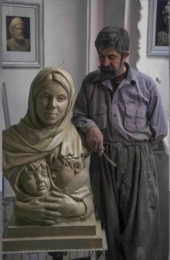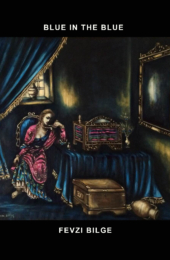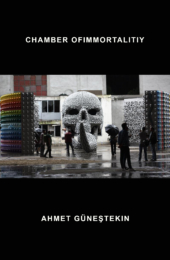Metamorphosis of War: 11 Sculptures Forgedfrom War’s Remnants
eywan Saedian appears to be a multidisciplinary artist with a focus on sculpture, photography, painting, and writing. Based in Stockholm, Sweden, he studied at the University of Sulaimani/College of Fine Arts. Saedian's Instagram profiles (@seywan.saedian and @seywan.saedian.photo) showcase his artistic endeavors, revealing a diverse portfolio and a significant following. Additionally, his professional background is highlighted on LinkedIn. For more detailed information about his work and contact details, one can visit his official website at pasariartproduction.com. The artist's engagement on various platforms like Facebook and Pinterest provides further insights into his creative journey [1] [3] [4] [5] [6].
Director: Seywan Saedian
Mastoureh Ardalan Sculpture
Hadi Zia-dini is a renowned Kurdish designer, painter, and sculptor. Notable works include a statue of Ardalan in Sanandaj, Rojhêlat[5]. He is recognized for his contributions in various artistic mediums, with a book titled "Hadi Zia'-Od Dini: designer & painter & sculptor" by Hanibal Alkhas highlighting his achievements[1]. The book emphasizes his role as a designer and sculptor, showcasing his creative prowess[1]. Hadi Zia-dini's impact extends to diverse forms of art, including sculpture and painting, as evidenced by his work and presence on platforms like YouTube[2] and Pinterest[6].
Director: Hadi Zia-dini
Ehmedê Xanî
- Ehmedê Xanî: A Kurdish polymath and poet from the 17th century, known for his work "Mem û Zîn," a Kurdish classic that explores love and social issues [3].
- Taylan Mintaş: An interdisciplinary contemporary artist, director, and screenwriter based in Istanbul. He has curated exhibitions related to Ehmedê Xanî, bridging poetry and philosophy [5].
- Digital Representation: Taylan Mintaş utilized artificial intelligence to animate Ehmedê Xanî, bringing the historical figure to life through technology [6].
- Contact: Taylan Mintaş can be reached at mintastaylan@gmail.com and is affiliated with Marmara University and Yildiz Technical University [1] [2].
Director: Taylan Mintaş
Izedinê Heremşedad
Biography Of Lukman Ahmad
Through expressionism and imagination, Lukman presents the spectrum of a human experience, and invites the viewer to know another culture. From a brush, music, dance, laughter, suffering, compassion, and passion, incite the viewer’s eye to experience from a story of a people – a people forgotten and without a nation, yet a people that has retained a rich and full culture.
Syrian born, Lukman reflects the Kurdish experience as well as the human experience. Self-educated, and deeply in touch with his people and with the intertwined surrounding cultures, he expresses imagination and experiences with authenticity, allowing color and movement to tell the story, be it one of pain or of happiness, of contemplation or passion. He combines symbolism and imagination, color and rhythm, to transport the viewer into the world he lived and the emotions he witnessed.
With over 45 exhibits in various countries, including Syria, Turkey, Iraqi Kurdistan, Switzerland, Lebanon and the United states, he strives to deliver that spectrum of life. Galleries and exhibits have ranged from solo exhibits such as in Washington, D.C. with the Foundary Gallery (2012), the Voice of America building (2015), and the Jerusalem Fund Gallery (2013); and group exhibits such as the West Branch Gallery and Sculpture Park in Stowe, Vermont (2016), Artomatic in Maryland (2012, 2015, and 2016), the Ackland Art Museum with the University of North Carolina (2011), and the workhouse Art Center in Virginia (2014), The Jerusalem gallery, Washington DC (2013-2019) and Artfactory, VA (2022)
Lukman’s work is art with purpose. With each exhibit, he maintains sight of art’s value and its role in the human experience. His work reflects that value as a path to understanding oneself and one’s environment, and as a method to show the Kurdish experience and to remove conflict and suffering. Purpose, value, and vision, through symbolism, expressionism, and color.
Throughhis experience, which began to change after the outbreak of the civil war inSyria, especially in the struggle against terrorism in his Kurdish region inthe northeast of Syria, he is trying to highlight the human rights violationsduring the wars. Along with his colorful paintings and expressive emotion, theblack color also offers the tragedy of death and hope together in his currentpaintings.
Hisexperience depends not only on the aesthetic aspect, but also on its culturaldimension and how to use cultural and cognitive tools to make art a positiveapproach to a civil culture based on human values of respect and acceptanceof the other in addition to the aesthetic sophistication of the artistic work.
He is working with VOA since 2014 –Kurdish service
Director: Luqman Ahmad
Blue in the Blue
- "Blue in the Blue" is a work by Fevzi Bilge, featuring a story with an ISBN of 978-9944-382-59-5, released in 2018 [1].
- There is no direct information in the search results about the phrase "blue in the blue." However, considering the context of the provided information, it could be related to the mentioned work by Fevzi Bilge [1].
- Fevzi Bilge is an author and writer associated with "Blue in the Blue" [1].
- Sezgi Bilge, possibly a relative of Fevzi Bilge, has an Instagram account with the handle @sezgibilgee [2].
- There is no apparent connection between the phrase and Marin Base or Mine Bilge mentioned in the search results [3, 4].
In summary, "Blue in the Blue" is a work by Fevzi Bilge, but the specific context of the phrase in the question is not clear from the provided information.
Director: Fevzi Bilge
Mother and Patriot
Zouhair Hasib Ali
Born in Hasaka, Syria 1960 of Kurdish origins; Zouhair Hasib would break down barriers as a Kurd. Kurdish people were not allowed to achieve higher education, historically. However, unwavering and determined, he graduated with an art diploma and was at the top tier of his class from the University of Damascus. But this would be only the beginning.
He would later exhibit not only in his hometown of Hasaka but in Europe, Damascus, Dubai and throughout other parts of the Middle East. His works would be featured in governmental buildings, businesses and residences. And there would be many who would be fortunate to have the privilege of his tutelage deemed him “Professor.” He is currently a member of the Union of Plastic Artists in Syria.
Solo exhibitions
1980 Al-Hasakah, the Arab Cultural Center
1989 Germany, Dresden. Palace of Culture
1990 Damascus, Ishtar Gallery
1991 Aleppo, Al-Khanji Hall
2000 Damascus, Nasir Shura Gallery 2002 Damascus, Naseer Shura Gallery 2007 Damascus, Al-Sayed Gallery 2009 Kurdistan Iraq, Sulaymaniyah Sooruka Hall.
2010 Damascus, Mr. Hall
Collective exhibitions
Damascus National Museum Greetings to the martyrs
Sophia, International Youth Exhibition
Amman, Muscat Biennial for Youth
Beirut, with artist Fateh Al-Mudaris, Dar Al Nadwa
2003 Damascus, honoring the late artist Omar Haseeb
2004 Aleppo, Kalimat Gallery
2005 Kurdistan Iraq, Sulaymaniyah Gallery ROJ
2009 France, Paris
Director: Zouhair Hasib Ali
Chamber of Immortalitiy
- Overview: "Chamber of Immortality" is an exhibition by Ahmet Güneştekin, showcased in the 13th edition of Contemporary Istanbul. The accompanying book delves into the immersive experience, featuring an introductory text[1].
- Artistic Elements: Güneştekin employs thousands of metal human skulls and spiky animal horns to retell ancient stories, creating a unique visual narrative[6]. The artwork explores the concept of immortality, drawing on symbolism like snakes, considered sacred for their immortality[3].
- Exhibition Context: The artist's recent paintings, including "Momentum of Memory" and "Encounter," contribute to the thematic exploration within the exhibition[2].
- Social Media Presence: Ahmet Güneştekin shared details on Instagram, showcasing the "Chamber of Immortality" at Göbeklitepe, emphasizing the significance of the space[4].
- Visual Insight: A video titled "Ölümsüzlük Odası (Chamber of Immortality)" on YouTube offers a visual glimpse into the immersive art experience[5].
In summary, "Chamber of Immortality" by Ahmet Güneştekin is a visually compelling exhibition exploring themes of immortality through diverse artistic elements and narrative symbolism. The artist's use of unconventional materials adds depth to the storytelling, making it a captivating and thought-provoking experience.
Director: Ahmet Güneştekin
Penceşer Recep içen
The phrase "Penceşer Recep içen" appears to be a combination of names and terms related to performance arts in Kurdish culture. Recep İçen is associated with Şaneşîn Performans, a platform supporting independent artists in the cultural and arts ecosystem [1]. "Penceşêr" is a play co-authored by M. Xalit Ertoşî and Recep Îçen, inspired by Rolan Topor's work [2]. Recep İçen is mentioned as a contributor to the performance arts, specifically in writing and execution within Şaneşîn Performans [3] [4]. The term "ŞanoyaKurdî" is linked to Recep İçen and his role in a new story named "Penceşêr" within Şaneşîn Performans [5].
Director: Recep içen







